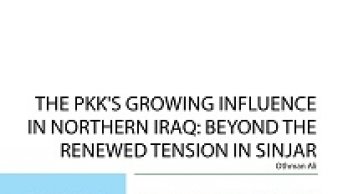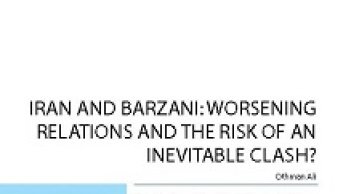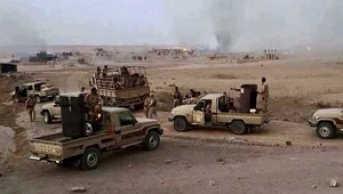US and Iran Confrontation: the Spillovers in Iraq

As far as Donald Trump’s presidential term is concerned so far, his confrontational policy seems to have far-reaching consequences for the Middle East in general, and Iraq in particular. One of the possible effects will be furtherradicalization of Shiite actors in Iraq in favorof thepro-Iranian elements in Baghdad. In addition, any open conflict between the United States and Iran over Iraq can lead the Kurdish people and Sunni Arabs to side with the Americans, which could in turn, brought the disintegration of Iraq.
In September2002, the then Secretary-General of the Arab League, Amr Moussa ended a foreign ministers' meeting in Cairo with a warning to the former US president George Bush that a strike against Iraq would “open the gates of hell” in a region already “angry and frustrated” due to Israel’s actions against the Palestinians. The US and world community then did not heed Moussa's plea. It would be valid to argue that should Trump goes ahead with his confrontational stated policies against Iran, further gates of hell will be openedin the Middle East and Iraq mightnot be able tostand achance to remain a united country.
The US relationship with Iran regarding Iraq has always been described as a rivalry.However, a close scrutiny of events points to covert cooperationduring the reigns of both former presidents Barack Obama and George W. Bush.The United States and Iraq share a common enemy in ISIL and, previously, in al-Qaeda in Iraq. The war against ISIL since 2014 has increased the American power in Iraq because US military force and fire power have enabled Iraq to restore onethird of Iraq’s territories lost to ISIL. Today,the US has about 6000 troops and an equal number of security and technical personnel. The war against ISIL has also enabled Iranians to recruit an umbrella force for Shiite militias, named al-Hashdal-Shaabi, which is no less than 120,000-strong andis reminiscent of the Iranian Revolutionary Guard. These militias, many of which receive training and logistical support from Iran, have been recently incorporated into Iraqi security forces.
It has been reported that behind the scenesNouri al-Maliki, former PM, and his supporters have done their best to deny the Iraqi army and al-Abadi a victory in Mosul. These efforts included, among other things, attempts at delaying the Mosul Operation, anddismissing Khalid al-Obaidi, the Minister of Defense, at this critical juncture. Moreover, pro-Iranian political circles in Iraq made numerousprovocative statements against Kurdish Peshmerga forces to divert attention from Mosul,and to discourage Kurds from joining the operation.
After the expulsion of ISIL from Mosul, the common enemy will no longer be there, and the US and Iranian authorities might possibly start to settle their differences in Iraq through their Iraqi proxies. Some elements from militias and pro-Maliki political forces have already stated that they intend to expel any influence the United Stateswould have in the post-ISIL Iraq. These include waging wars on Masud Barzani's KDP forces and Nineveh Guards of Atheel al-Nujaifi. Having returned from avisit to Iran last year, al-Maliki has spentintensive efforts to restore power in Baghdad with the Iranian help.These included visits to several cities in the Shiite southand the Kurdish opponents of Barzani in the KRG, to rally support for the next Iraqi national election.Al-Maliki group occasionally threaten al-Abadi with a parliamentary inquiry about his alleged misconduct and corruption. The pro-Maliki media has been portraying al-Abadi as being too weak to deal with the growing demands of the Kurds and Sunnis.He has been accused of trying to cement alliance with ex-Baathist Sunni Iraqi officers.
Al-Abadi has also activated his camp into action.Ammar al-Hakeem and MuqtadaSadr, two important leaders of the Shiite National Alliance, seem to have sided with al-Abadi. Al-Hakeem had recently met some exiled Sunni leaders in Amman and Beirut and has invited them to be a part of the political process. Zalmay Khalil Zadeh, the former US ambassador to Baghdad, told al-Monitor on November 9,2016that it is still not too late to contain Iranian influence in Iraq. He argues that Shiite politicians have been very resentful of Qasim Suleimani, the commander of Al Quds force in the Iranian Revolutionary Guard,enjoying a high level of influence over the Iraqi internal affairs. If the United States pressures theKurds,they could support Hakeem's National ReconciliationProject, too. The success of National Reconciliation in Iraq will serve the US interests, and Khalil Zadeh urges the US and UN to provide the project with required support.
However, Trump's recent firm and aggressive stand toward Iraq and Iran has only radicalized the Iraqi scene and weakened al-Abadi's position. Trump has repeatedly stated that Iraq's oil should have been seized by the US after 2003 invasion of Iraq,and explicitly said that the United States is looking "for a second chance" to confiscate the Iraqi oil. These statements have enraged many Iraqis across the political spectrum.This state of affairs was further exacerbated due to the US travel ban on the Iraqis and Trump’s escalating attacks on Iran. The ban has been described asa “golden opportunity” for Iran to push back against the United States. “Iraqis are very worried,” argued Kamran Karadaghi, former chief of staff to the Iraqi presidency.Karadaghi further maintained that “If anything bad happens to Iran because of Trump, it will be bad for Iraqis.The pro-Iranian Iraqi law-makers in the Iraqi Parliament rushed a session to consider retaliationmeasures against the United States. Eventually, al-Abadi’s pragmatism and the needed US military help in the ongoing war in Mosul averted these efforts.
On 14 February 2017, Iranians have retaliated against Trump's policy by further enhancing their power in Baghdad through the appointment of IrajMasjidi, a close aide to Suleimani,as Iran's Ambassador to Iraq. On 15 February 2014, though known for his hawkish view on Sunnis,Kurds, and the United States, Jalal al-Araji, a militia commander from pro-Iranian BadrBrigade,was chosen as the Minister for Interior.
Analysts believe if these tense relations between Iran and the United States continue and Trump administration's insensitive provocative stand toward Iraq ismaintained, al-Abadi will be the first victim of this policy either through Iranian–instigated militias’takeoverof power in Baghdad,or in the upcoming national election. The current pressure on Iraq could backfire as Iraqis would likely respond by electing a hardliner like al-Maliki or somebody close to his circle.Moreover, Barzani is on record saying that in the event of the return of al-Maliki to power, Kurds will have no option but to leave Iraq. The Sunni Arab leaders who have experienced al-Maliki's sectarian policies think likewise.
For these reasons, as the US policy makers ponder upon policies to contain the Iranian influence in Iraq, they need to take into account the complicated internal scene there. Judging from what Trump has said and done so far, it does not seem that he is fully aware of this. The spill-overs of the escalating confrontation between Trump and Iranian authorities might have quite negative consequences for the Iraqis. An African saying goes, "When two elephants fight, it is the grass that suffers."








